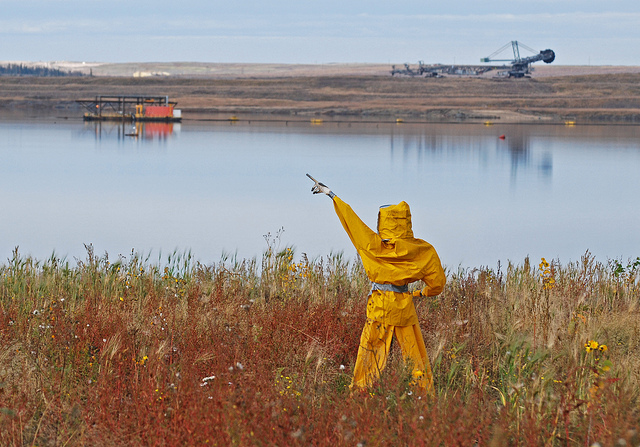Study Confirms Tar Sands Mining Destroying Local Ecosystems
By Andrea Germanos
22 February, 2014
CommonDreams.org

A scarecrow at a tailings pond in Alberta in 2010. (Photo: NWFblogs/cc/flickr)
A new study puts the spotlight on tar sands' threat to one of the planet's precious and increasingly scarce resources—water.
The study by Environment Canada shows that tailings ponds, open 'lakes' that hold toxic bi-products from tar sands mining, are leaching into groundwater and contaminating Alberta's Athabasa River.
The federal research was published in the journal Environmental Science and Technology.
The researchers used new technology to differentiate chemicals from naturally occurring bitumen deposits in soil around the developments from those released by the tar sands industry.
"It looks like what they’ve seen is that in fact the tailings ponds are leaking," CBC News quotes Bill Donahue, an environmental scientist with the governmental tar sands advisory committee, as saying.
"They found also not only are those tailings ponds leaking, but it looks like it is flowing pretty much from those tailings ponds, through the ground and into the Athabasca River," Donahue continued. "So, there goes … that message we’ve been hearing about. 'These tailings ponds are safe, they don’t leak' and so on."
"While the study confirms what we already know to a certain extent," Andrea Harden-Donahue, Energy and Climate Justice Campaigner with the Ottawa-based organization Council of Canadians, told Common Dreams, "it's sad to see the federal government so far behind."
First Nations communities have been talking for years about this water contamination, Harden-Donahue explained. They've been "linking it to illnesses, talking about deformed fish, how it's entering their food system, and for years they have been calling for the problem to be examined," concerns Canadian rocker Neil Young sought to elevate with his recent "Honour the Treaties" tour.
These downstream communities continue to be "on the front lines," Harden-Donahue said, both in terms of the impacts of the dirty industry and of leading opposition. "First Nations communities are our best and brightest hope for stopping the expansion of the tar sands," she said.
While "we talk a lot about climate change" impacts from tar sands, what also needs to be considered is how "the use, consumption and contamination of water" as a result of the mining and transporting of this bitumen affect essential watersheds, Harden-Donahue explained, and cited the notorious spill in Michigan's Kalamazoo River.
Contributing to the problem is that what little regulation that does exist, both at the federal and provincial level, she said, doesn't get enforced, as it's a case of the fox guarding the hen house because much of the regulation is industry-led. Looking at last year, "of the more than 4000 infractions [by the tar sands industry] that were reported, less than 1 percent were penalized," she noted.
Yet as the Harper government is dragging in terms of regulating tar sands, and is repealing environmental protections, there is mounting pressure fighting back, Harden-Donahue said.
"It's an uphill battle," she said, but "we're going to win."
This work is licensed under a Creative Commons Attribution-Share Alike 3.0 License
Comments are moderated
